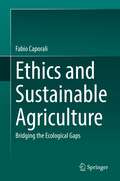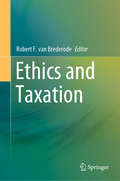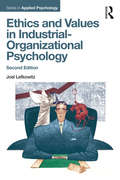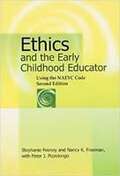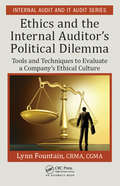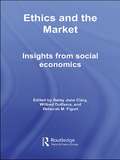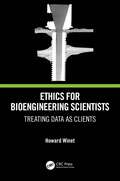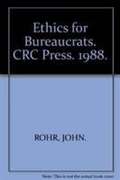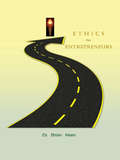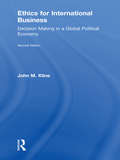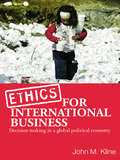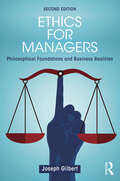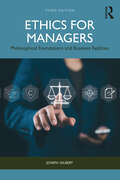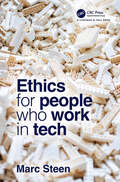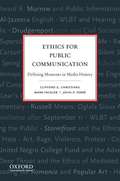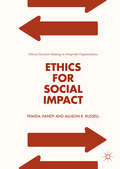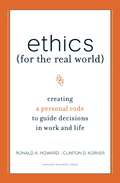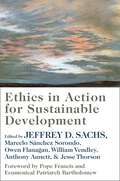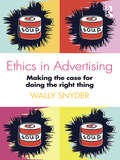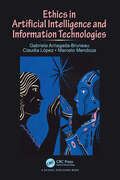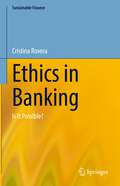- Table View
- List View
Ethics and Sustainable Agriculture: Bridging the Ecological Gaps
by Fabio CaporaliThis book describes the alarming condition of agriculture in the Anthropocene, when the ethical conception of agriculture as a service of common utility for both society and environment has progressively been marginalized. The ethical utility of agriculture has been sidetracked with the increasing industrialisation of society, the involvement of agriculture in the business-as-usual economy, and the consequential environmental and societal impacts it has had. Thus, re-establishing a meaningful bridge between ethics and agriculture is necessary. A relatively new science (ecology) with both a new epistemological tool (that of the ecosystem concept), and a unique narrative of sustainable development, can help bridge this gap. This book focuses on ethics as a lever for raising scientific, technical, social, economic and political solutions to adopt in agriculture as a model of symbiotic relationships between man and nature. It provides a detailed discussion of the ecological intensification practices in order to maximize ecological and ethical services, wherein agroecosystems will follow.
Ethics and Taxation
by Robert F. van BrederodeThis book does not present a single philosophical approach to taxation and ethics, but instead demonstrates the divergence in opinions and approaches using a framework consisting of three broad categories: tax policy and design of tax law; ethical standards for tax advisors and taxpayers; and tax law enforcement. In turn, the book addresses a number of moral questions in connection with taxes, concerning such topics as: • the nature of government • the relation between government (the state) and its subjects or citizens • the moral justification of taxes• the link between property and taxation• tax planning, evasion and avoidance • corporate social responsibility• the use of coercive power in collecting taxes and enforcing tax laws • ethical standards for tax advisors • tax payer rights • the balance between individual rights to liberty and privacy, and government compliance and information requirements • the moral justification underlying the efforts of legislators and policymakers to restructure society and steer individual and corporate behavior.
Ethics and Values in Industrial-Organizational Psychology, Second Edition (Applied Psychology Series)
by Joel LefkowitzEthics and Values in Industrial-Organizational Psychology was one of the first books to integrate work from moral philosophy, moral psychology, I-O psychology, and political and social economy, as well as business. It incorporates these perspectives into a "framework for taking moral action" and presents a practical model for ethical decision making. The second edition has added a chapter on Virtue Theory, including its application in I-O, Organizational behavior (OB) and business; expands Moral Psychology to two chapters, with more attention to moral emotions, effects of the "dark side" of personality, and the intuitionist model of moral judgment; expands the sections on social and economic justice; and expands the treatment of the Responsible Conduct of Research with a new chapter on Research Integrity. Examples from I-O research and practice, as well as current business events, are offered throughout. It is ideal for ethics and I-O courses at the graduate level.
Ethics and the Early Childhood Educator: Using the NAEYC Code (2nd Edition)
by Peter J. Pizzolongo Stephanie Feeney Nancy K. FreemanThe second edition of Ethics and the Early Childhood Educator: Using the NAEYC Code is an NAEYC resource that we are pleased to publish and that follows a history of two minor revisions to the first edition. This edition includes situations that involve ethical dimensions--responsibilities and dilemmas-- based on the 2005 revision and the 2011 reaffirmation and updating of the Code.
Ethics and the Future of Capitalism
by Wojciech W. GasparskiWith the collapse of communism and the accelerated trend of globalization, a new stage of capitalism has arrived. Protest actions that occurred in Seattle and Washington as well as in Prague and Genoa, clearly show that the legitimacy of capitalism is being questioned in many respects. Surveys in Eastern and Central Europe show that a considerable part of the population is not able to accept capitalism as an economic system. This volume assesses the ethical basis of capitalism in an effort to assess its future in the twenty-first century.Contributors range from one of the world's most successful capitalists and philanthropists to the founder of INSEAD, Europe's leading business school, to noted economists, philosophers, cultural historians, and business ethicists.
Ethics and the Global Financial Crisis
by Boudewijn De BruinIn this topical book, Boudewijn de Bruin examines the ethical 'blind spots' that lay at the heart of the global financial crisis. He argues that the most important moral problem in finance is not the 'greed is good' culture, but rather the epistemic shortcomings of bankers, clients, rating agencies and regulators. Drawing on insights from economics, psychology and philosophy, de Bruin develops a novel theory of epistemic virtue and applies it to racist and sexist lending practices, subprime mortgages, CEO hubris, the Madoff scandal, professionalism in accountancy and regulatory outsourcing of epistemic responsibility. With its multidisciplinary reach, Ethics and the Global Financial Crisis will appeal to scholars working in philosophy, business ethics, economics, psychology and the sociology of finance. The many concrete examples and case studies mean that this book will also prove useful to policy-makers and regulators.
Ethics and the Internal Auditor's Political Dilemma: Tools and Techniques to Evaluate a Company's Ethical Culture (Security, Audit and Leadership Series #10)
by Lynn FountainThis book helps auditors understand the reality of performing the internal audit role and the importance of properly managing ethical standards. It provides many examples of ethical conflicts and proposes alternative actions for the internal auditor. Internal auditors are well-schooled on the IIA Standards, but the reality is that the pressure placed on internal auditors related to execution of work and upholding ethical standards can be very difficult. Regardless of best practice or theory, auditors must be personally prepared to manage through issues they run across.
Ethics and the Market: Insights from Social Economics (Routledge Advances in Social Economics)
by Wilfred Dolfsma Deborah M. Figart Betsy Jane ClaryComprising cutting-edge work on the state of social economics today, this theoretically diverse book includes strong emphasis on the role of ethics, morality, identity, and society in economic theorizing. Much existing economic theory overlooks ethics. Rather than situating the market and values at separate extremes of a continuum, Ethics and the Market contends that the two are necessarily and intimately related. This volume brings together some of the best work in the social economics tradition, with strong contributions and pedagogy, and a cross-national blend of economics, philosophy, and policy. The contributors embed the economic within the social, rather than viewing 'the economy' and 'society' as separable spheres of life activity, and in so doing, three key themes are illuminated, corresponding to the volume's tripartite structure: Morality and Markets Redefining the Boundaries of Economics Social Economics in Transition. Ethics and the Market illuminates the diverse and dynamic theoretical approaches that are employed in social economics, reflecting on their continuously evolving relationship with neoclassical economics. Taking an innovative approach, this integrative book challenges traditional ways of thinking, and will prove vital reading for students and academics in the fields of Economics, Sociology, Gender Studies, and Public Policy.
Ethics for Bioengineering Scientists: Treating Data as Clients
by Howard WinetThis book introduces bioengineers and students who must generate and/or report scientific data to the ethical challenges they will face in preserving the integrity of their data. It provides the perspective of reaching ethical decisions via pathways that treat data as clients, to whom bioengineering scientists owe a responsibility that is an existential component of their professional identity. The initial chapters lay a historical, biological and philosophical foundation for ethics as a human activity, and data as a foundation of science. The middle chapters explore ethical challenges in lay, engineering, medical and bioengineering scientist settings. These chapters focus on microethics (individual behavior) and cases that showcase the consequences of violating data integrity. Macroethics (policy) is dealt with in the Enrichment sections at the end of the chapters, with essay problems and subjects for debates (in a classroom setting). The book can be used for individual study, using links in the Enrichment sections to access cases and media presentations like PBS’ "Ethics in America". The final chapters explore the impact of bioengineering science ethics on patients via medical product development, its regulation by the FDA, and the contribution of data integrity violation to product failure. The book was developed for advanced undergraduate and graduate students in bioengineering. It also contains much needed material that researchers and academics would find valuable (e.g., FDA survey and lab animal research justification). This book Introduces an approach to ethical decision-making based on treating data as clients Compares the ethics of three professions; engineering, medicine, and bioengineering Provides five moral theories to choose from for evaluating ethical decisions, and includes a procedure for applying them to moral analysis, and application of the procedure to example cases Examines core concepts, like autonomy, confidentiality, conflict of interest, and justice Explains the process of developing a medical product under FDA regulation Explores the role of lawyers and the judiciary in product development, including intellectual property protection Examines a range of ethical cases, from the historical Tuskegee autonomy case to the modern CRISPR-Cas9 patent case. Howard Winet, PhD is an Adjunct Professor recall, Orthopaedic Surgery and Bioengineering at University of California, Los Angeles.
Ethics for Bureaucrats: An Essay on Law and Values (2nd Edition, Revised and Expanded)
by John A. RohrThis important text integrates the study of ethics into public management training, highlighting Supreme Court opinions on three specific constitutional values-equality, freedom, and property-focusing on the pedagogical aspects of law and posing challenging questions to help readers apply theories to concrete situations. It includes a case index for further research. Topics of specific interest include abortion, affirmative action, bureaucratic bashing, civil disobedience, the Ethics in Government Act of 1978, the Iran-Contra scandal, moral absolutism, privileged communications, religious fundamentalism, and whistle blowing. The Midwest Review of Pubic Administration lauds it as "⬦a unique teaching tool. "
Ethics for Entrepreneurs
by Dr Brian KeenThis is the first book in the Ethics for Entrepreneurs series. This is utilizing a cutting edge approach to publishing. Entrepreneurs always encourage cutting edge approaches to improve life for everyone. The Theanthropic Ethical category is one of the few scientific ethical categories. Entrepreneurs will appreciate the fact that this book is evaluated by fellow entrepreneurs who are professionals. Entrepreneurs drive our business communities through resolving problems. This creates wealth for all stakeholders. All successful entrepreneurs establish businesses, enterprises, or professions that are based on ethical standards. For entrepreneurs the best ethical standards based upon scientifically verifiable, objective standards. Theanthropic Ethics© is one of the only ethical categories on which entrepreneurs can depend. Theanthropic Ethics© is thoroughly evaluated within the context of entrepreneurship. Theanthropic Ethics© recognizes that freedom is an essential component for all entrepreneurs to become successful.
Ethics for International Business: Decision-Making in a Global Political Economy
by John KlineBusiness takes place in an increasingly global environment, crossing political and cultural boundaries that challenge corporate values. The central focus of this successful and innovative text lies in how to make and explain 'best choice' judgments when confronting ethical dilemmas in international business situations.The newly-updated version of this groundbreaking textbook continues to provide a topical and relevant analysis of the ethical dimensions of conducting business in a global political economy. From a starting point of applied ethics, the book introduces a common set of normative terms and analytical tools for examining and discussing real case scenarios. Extensive real-world examples, presented in the form of exhibits, cover issues including: foreign production, including sweatshops export of hazardous products testing and pricing of HIV-AIDS drugs advertising tobacco, alcoholic beverages and infant formula deceptive marketing techniques and bribery religious and social discrimination cultural impacts from 'music, movies and malls' environmental issues, including oil spills, rain forest preservation, global warming and genetically modified foods fair trade certification and consumer boycotts oil investments in the Sudan, Burma and Nigeria. To keep pace with the changing landscape of global business, this new edition features: updated exhibits that introduce new issues, including internet censorship and privacy, marketing and obesity, dumping electronic waste in Ghana, the costs of bottled water, and Wal-Mart’s supplier code in China increased coverage of issues arising in emerging markets updated descriptions and assessments of relevant international agreements seventeen new photographs that were chosen to accompany cases designed for classroom discussion "framing questions" to guide discussion of issues in topical chapters three additional figures that help depict the ethical analysis process. The continued globalization of business increases the relevance of this textbook and its unique focus on specifically international ethical challenges faced by business, where governments and civil society groups play an active role. While most business ethics texts continue to focus heavily on ethical theory, this textbook condenses ethical theory into applied decision-making concepts, emphasizing practical applications to real world dilemmas.Anyone with an interest in the ethical implications of international business, or the business implications of corporate responsibility in the global market, will find this book a thought-provoking yet balanced analysis. Clearly written, this has become the textbook of choice in this increasingly important field.
Ethics for International Business: Decision-Making in a Global Political Economy
by John M. KlineFirst published in 2004. Routledge is an imprint of Taylor & Francis, an informa company.
Ethics for Managers (Routledge Revivals)
by Philip HoldenThis title was first published in 2000: This text examines the relationship between ethics and business, looking in detail at key areas like personal standards, leadership, marketing, empowerment and the implications of "going green". Practical guidance is offered based largely on what successful organizations are already doing. Drawing on sources ranging from classic philosophy to modern managment expertise, Philip Holden shows how meeting the needs of employees, customers and the community, together with respect for the environment, can lead to improved business performance.
Ethics for Managers: Philosophical Foundations and Business Realities
by Joseph GilbertEthics for Managers introduces students to the philosophical underpinnings of business ethics and translates this theory into practical terms, demonstrating the moral implications of the decisions managers make. This edition features new material on global ethics, the financial downturn, and ethical sustainability. New, student-friendly features include: Learning objectives at the beginning of each chapter, which provide a roadmap to what is covered and how to use it. Cases that demonstrate real-world scenarios, allowing readers to grapple with real moral ambiguity. Discussion questions at the end of each chapter, which challenge students to see different moral perspectives and to practice good decision-making. A new chapter on international business ethics. Students of business ethics courses will find this compact, well-organized text a useful tool to understand ethics in the digital age.
Ethics for Managers: Philosophical Foundations and Business Realities
by Joseph GilbertEthics for Managers introduces students to the philosophical underpinnings of business ethics and translates this theory into practical terms, demonstrating the moral implications of the decisions managers make. It explains the decision-making processes and constraints that managers face, regardless of their level or function. It then proceeds to show how to identify and analyze the ethical aspects of these decisions.This third edition features updated examples and references throughout. It contains new material on managing employees working from home, increased emphasis on the pattern aspects of individual decisions and on the systemic constraints that affect managers’ decisions. There is a completely new chapter on artificial intelligence. This chapter explains at a basic level what artificial intelligence is, and examines its impact on decisions concerning the hiring, monitoring, evaluating, profiling and termination of employees.Student-friendly features include learning objectives at the beginning of each chapter, examples that demonstrate real-world business decisions, and end of chapter discussion questions. These discussion questions provide opportunities for applying chapter materials to actual decisions and can stimulate class discussion or serve as test questions. Students will find this compact, well-organized text a useful tool for understanding ethics in the digital age.
Ethics for People Who Work in Tech
by Marc SteenThis book is for people who work in the tech industry—computer and data scientists, software developers and engineers, designers, and people in business, marketing or management roles. It is also for people who are involved in the procurement and deployment of advanced applications, algorithms, and AI systems, and in policy making. Together, they create the digital products, services, and systems that shape our societies and daily lives. The book’s aim is to empower people to take responsibility, to ‘upgrade’ their skills for ethical reflection, inquiry, and deliberation. It introduces ethics in an accessible manner with practical examples, outlines of different ethical traditions, and practice-oriented methods. Additional online resources are available at: ethicsforpeoplewhoworkintech.com.
Ethics for Public Communication: Defining Moments in Media History
by Clifford G. Christians; Mark Fackler; John P. FerreFocusing on one historic episode per chapter, Ethics for Public Communication is divided into three parts, each dedicated to one of the three major functions of the media within democratic societies: news, persuasion, and entertainment. Authors Clifford Christians, Mark Fackler, and John Ferré, three trusted scholars in the field, discuss media ethics from a communicative perspective, setting the book apart from other texts in the market that simply combine journalism with libertarian theory. Classic media ethics cases, like the publication of Rachel Carson's 1962 book Silent Spring, are covered in tandem with such contemporary cases as the creation of Al-Jazeera English and the controversy surrounding Ice-T's protest song, "Cop Killer."
Ethics for Social Impact: Ethical Decision-making In Nonprofit Organizations
by Femida Handy Allison R. RussellThis book outlines the various elements involved in ethical decision-making for nonprofit leaders, and whose rights to prioritize when facing complex situations. Nonprofit board members and employees are often placed in difficult situations, with no single stakeholder and an allegiance to mission statements whose outcomes can be difficult to measure. While nonprofit charitable organizations are generally considered more trustworthy than their counterparts in the public or for-profit sector, when scandals and wrongdoings are uncovered, they must be dealt with in ethical ways. Through a case study approach, this book delivers clear ethical decision-making frameworks and promotes robust reflection on how to arrive at different decision points and throw light on elements that are often ignored or assumed. Ultimately, it offers students, researchers, and managers a practical approach to the ambiguous question, what is the ethical way?
Ethics for the Real World
by Clinton D. Korver Bill Birchard Ronald A. HowardWe often make small ethical compromises for "good" reasons: We lie to a customer because our boss asked us to. We exaggerate our accomplishments on our résumé to get an interview. Temptation blindsides us. And we make snap decisions we regret.Minor ethical lapses can seem harmless, but they instill in us a hard-to-break habit of distorted thinking. Rationalizations drown out our inner voice, and we make up the rules as we go. We lose control of our decisions, fall victim to the temptations and pressures of our situations, taint our characters, and sour business and personal relationships.In Ethics for the Real World, Ronald Howard and Clinton Korver explain how to master the art of ethical decision making by:Identifying potential compromises in your own lifeApplying distinctions to clarify your ethical thinkingCommitting in advance to ethical principlesGenerating creative alternatives to resolve dilemmasPacked with real-life examples, this book gives you practical advice to respond skillfully to life's inevitable ethical challenges. Not only can you make right decisions, you can acquire new habits that will realize the best in yourself and transform your relationships.
Ethics in Action for Sustainable Development
by Sachs, Jeffrey D.; Sorondo, Marcelo Sánchez; Flanagan, Owen; Vendley, William; Annett, Anthony; Thorson, JesseThe Sustainable Development Goals, adopted by the United Nations in 2015, comprise an ambitious and sweeping agenda that unites economic, social, and environmental aims. What resources do the world’s religious and secular traditions offer in support of these objectives? Which principles do these traditions hold in common, and how can these shared values help advance global goals?This book presents an in-depth and deeply engaged conversation among interfaith religious leaders and interdisciplinary scholars and practitioners in pursuit of an ethical consensus that could ground sustainable development efforts. Drawing on more than two years of close-knit discussions convened by Jeffrey D. Sachs and Marcelo Sánchez Sorondo, it offers an extensive and inclusive vision of how to promote human flourishing. The book features theological, philosophical, and ethical deliberations of great diversity and depth on the challenges of sustainable development, addressing questions of poverty, environmental justice, peace, conflict, and the future of work. It includes consensus statements on the moral imperatives of sustainable development, introductions to seven major religious traditions and their conceptions of the common good, and thematic reflections. Wide-ranging and urgent, this book represents a major contribution to interreligious dialogue and to the articulation of a shared global ethics.The book features a foreword by Pope Francis and Ecumenical Patriarch Bartholomew.
Ethics in Advertising: Making the case for doing the right thing
by Wally SnyderThis book provides students and practitioners with a comprehensive overview of the rules and principles associated with ethical advertising practices. With extensive research, and a variety of case studies, and expert opinions, it discusses why advertising ethics is important both to the consumer and the professional. The author presents the rules of ethical conduct recommended by the Institute for Advertising Ethics and demonstrates how these are applied in practice, examining why ethics is important; what the ethical dilemmas the industry faces are; and how to motivate better practices among professionals. The book uses real life stories of "native advertising," marketing to children, and diversity in advertising to show how professionals can be inspired to "do the right thing" for consumers and their companies. Readers will learn how they can solve ethical dilemmas to their personal satisfaction in the competitive work environment. This balanced perspective to the ethical issues that arise in the advertising industry is sure to resonate with students of advertising and marketing.
Ethics in Artificial Intelligence and Information Technologies
by Marcelo Mendoza Gabriela Arriagada-Bruneau Claudia LópezThis book addresses the challenges posed by adopting and developing new AI technologies and how they impact people. Ethics, the scope, and the impact of technology on people are vital. The book starts with the ethical aspects of AI, presenting a socio-technical approach to integrating Ethics into AI projects, and outlines perspectives around feminism, sustainability, and labor transformation. Next, the concepts of fairness, accountability, and transparency are introduced, discussing their implications for developing information systems such as recommender systems, including aspects related to data privacy. Then the book covers the relevance of natural language processing systems, highlighting debias strategies and evaluation methodologies. The scopes of fairness-based approaches for ChatGPT and other generative text models are also introduced. Finally, advanced topics that include the relationship between AI and disinformation are addressed, including a discussion of the scope of news-generative models such as deep fakes. The book ends with a discussion of the perspectives and challenges in the area.The book is meant for an audience of advanced undergraduate and graduate students from all disciplines related to information systems. It is also helpful for researchers and practitioners interested in the subject.
Ethics in Banking: Is It Possible? (Sustainable Finance)
by Cristina RoveraBanks are frequently considered usurers. Is it possible to talk about ethics when you analyse banking activity? This book focuses on this question and starts with the history and the philosophy. Philosophers like Aristotle, Immanuel Kant and John Stuart Mill proposed different theories about the need for ethics in finance. If we accept Mill's thought, the production of wealth in society is driven by the personal pursuit of profit. But - unfortunately - this does not, on its own, ensure collective well-being. It must be guided by a superior mechanism which transforms it into wealth for all. This introduces the role of financial institutions, which often have to comply with legal obligations. The book focuses on the role that these institutions have in supporting the ‘ethical’ use of money. The author analyses a number of cases in banks and the financial industry and discusses topics like anti-money laundering, anti-usury, islamic finance, microcredit and bank rescue systems, including not only best practices but also examples of unethical financial management.
Ethics in Banking: The Role Of Moral Values And Judgements In Finance (Palgrave Macmillan Studies in Banking and Financial Institutions)
by Jes VillaThe solution to the uninhibited lending that was commonplace before the financial crisis has been to introduce tighter regulation to ensure robustness within banks. However, this solution has overlooked the underlying problem of ethical failure in the industry. In the wake of numerous bank collapses, many survivors continue in unprincipled conduct because ethical virtues have not been instilled. This book investigates the ethical basis of banking practice. It explores the conflict between the interests of banks and their customers, and how this conflict plays out in relation to the lending policies and fee structures of banks. Where such lending policies have a significant effect on banks, their customers and a range of stakeholders, the author investigates the views of leading bankers on their lending practices. The author then goes on to debate the events of the global financial crisis from a moral perspective, and argues that ethical failure triggered the American sub-prime calamities which have devastated homeowners and the global economy. The book argues that American banks and regulators both operated on the erroneous supposition that the quest after extreme profits would be restrained by free market forces. Where banks have a central role and importance in all commerce and hence in all societies, the author concludes by revealing a set of virtues that are necessary for banks to espouse moral conduct. He suggests that these virtues can be embedded through leadership and cultural change, with the aim of developing an account of the virtues appropriate to bankers and banking.
